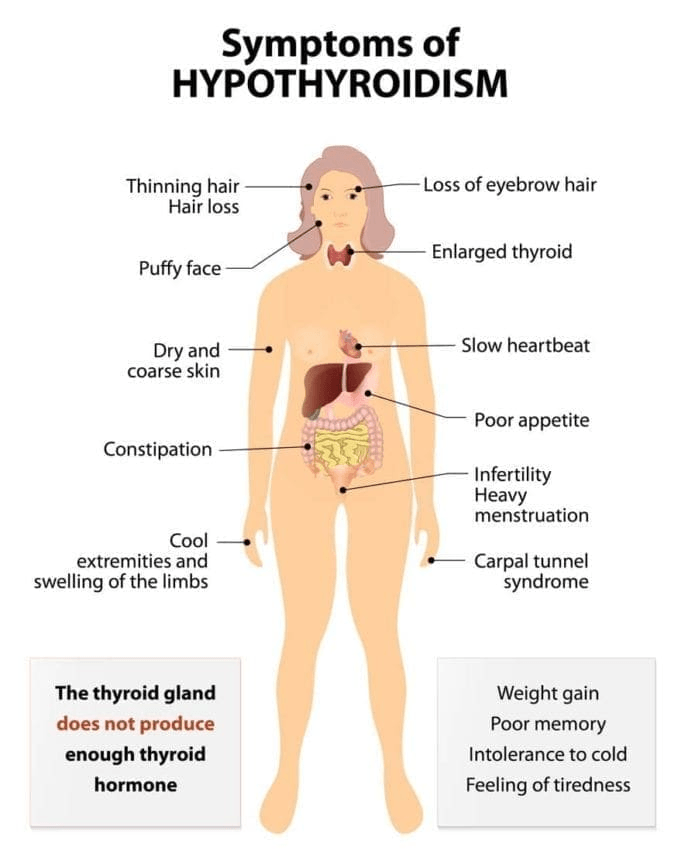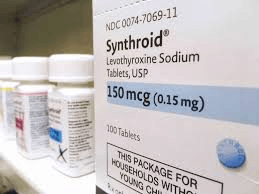On Thyroid Meds and Still Feeling Tired ?
+ Experiencing Other Low Thyroid Symptoms?
Here’s Why
The hidden reason women on Synthroid (L-Thyroxin) stay tired, foggy, and overweight… and what you can do about it.
“I eat less than I ever did… yet I can’t shake that weight.”
“I take my Synthroid faithfully… but I still feel tired.”
If that sounds familiar, you’re not alone.
Many women on L-thyroxine (Synthroid) for hypothyroidism still struggle with:
Constant fatigue or lack of motivation
Weight gain despite eating modestly
No hunger in the morning (the body’s “engine” never starts)
Low mood and mental dullness
Thinning hair and dry skin
Digestive sluggishness, bloating, or constipation
Stiff muscles and morning achiness

If you recognize two or more of these, your thyroid medication may not be restoring true thyroid function—only changing your lab numbers.
The Everyday Reality of Low Thyroid Energy
You wake up already tired.
You push through the day, running on coffee and willpower.
By late afternoon, even simple things—making dinner, answering messages, showing up for family—feel like uphill battles.
You can’t remember the last time you truly felt alert, light, or “in your body.”
You may even start doubting yourself: Am I just getting older? Am I doing something wrong?
No. You’re not.
Your body is simply under-fueled at the cellular level.

The Missing Piece: Why L-thyroxine Alone Isn’t Always Enough
L thyroxin (Synthroid) is a synthetic version of T4 is a storage form of thyroid hormone, NOT the active form of the hormone.
Your cells actually run on T3, the real deal, the active form of the hormone —the “spark plug” that powers metabolism, brain function, and energy production.
In many women—especially those under chronic stress, with nutrient deficiencies, sluggish digestion, or poor liver function—the conversion from T4 → T3 doesn’t work efficiently.
So you can have “normal” blood tests, even normal T3… yet your cells remain starved for energy.
Why are these labs so deceiving? Because blood levels may not reflect tissue levels. There are actually better ways to figure that out, bur anyways...
That’s why you can still feel tired, foggy, cold, and frustrated even though you’re doing everything “by the book.”

When Low Thyroid Isn’t Fully Corrected
Leaving thyroid function sub-optimal doesn’t just drain your energy; it quietly increases your risk for:
High cholesterol and triglycerides
High blood pressure
Heart disease and circulation problems
Insulin resistance and stubborn weight gain
Low mood and brain fog
Digestive slowdown and gallbladder issues
Menstrual and menopausal imbalances
Because the thyroid drives every cell’s metabolism, when it’s under-supported, the whole body slows down—from your heart and liver to your mind and mood.

The Hidden Downsides of Long-Term L-Thyroxine Use
While life-saving for severe hypothyroidism, relying solely on synthetic T4 for years can sometimes create new imbalances:
It can suppress your natural thyroid output over time, leaving your gland less responsive on its own.
Over-replacement may raise the risk of heart rhythm changes or bone density loss, especially in sensitive users or when doses are too high.
Research has also found that chronically high T4 levels can act as a growth signal for many tissues. Some studies have noted higher rates of certain cancers—particularly of the breast, lung, and liver—in people who’ve been on long-term, high-dose therapy. This doesn’t mean T4 causes cancer, but that when hormone levels run high for years, they may stimulate the growth of existing or dormant cells.
And if your T4 isn’t being efficiently converted into T3, you can still feel tired, foggy, and heavy, even though your labs look “normal.”
Medication can correct numbers, but true thyroid healing requires restoring the body’s ability to make and activate its hormones naturally.

The Diet Trap That Makes Things Worse
Many women, desperate to lose weight, turn to low-carb diets or fasting routines, and they still DON'T lose weight.
But for someone with a low thyroid, that’s like trying to drive with no fuel in the tank.
The thyroid needs steady carbohydrates to convert T4 into T3 efficiently.
Restrictive diets can:
Slow your metabolic rate even more
Raise stress hormones like cortisol and adrenaline
Block conversion to active T3
Trigger hair loss, fatigue, and hormonal chaos
The solution isn’t “less food”—it’s the right food, at the right times, in the right balance to rekindle metabolic fire.

Energy Is the True Test
Because thyroid hormone is the body’s main energy regulator,
a persistent lack of energy is a sign that your thyroid system isn’t fully supported
no matter what your bloodwork says.
When your thyroid function is truly restored, life feels different:
You wake up refreshed—and hungry (and that food doesn’t pile on as more fat).
You have energy that lasts through the afternoon.
You start shedding weight without starving yourself.
Your mind feels sharp again.
Your mood stabilizes.
Your hair thickens, your skin softens, and your confidence returns.
That’s not wishful thinking—it’s what happens when the thyroid and metabolism are finally working together again.

A Holistic Approach That Actually Works
In my naturopathic practice, I’ve helped many women who felt trapped in this same situation—faithfully taking medication yet feeling tired, dull, and unheard.
My comprehensive approach looks beyond T4 to the real barriers that prevent full recovery:
T3 conversion efficiency (liver, gut, nutrient factors)
Adrenal–thyroid balance (stress hormones that blunt thyroid activity)
Micronutrients needed for thyroid enzymes (selenium, zinc, magnesium, iron, B-vitamins)
Digestive and liver function (where hormone activation occurs)
Balanced carbohydrate intake to stabilize metabolism
Inflammation and autoimmune triggers
Once these are addressed, energy, mood, focus, and weight naturally begin to shift—often in the first few weeks.

It’s Not “You”—It’s the Incomplete Treatment Plan
If you’ve been told your thyroid is “fine” yet you still feel tired, heavy, or mentally flat, you’re not imagining it—and you’re certainly not lazy.
You simply haven’t received complete thyroid care.
Take the Next Step
If you’re ready to understand what your body has been trying to tell you—and to finally fix the root cause of your tiredness, schedule a short Thyroid Function Review with me.
In just a few minutes, we’ll uncover whether your medication is helping or holding you back—and outline a clear, personalized path to restore energy naturally.
“This is the first time someone explained why I still felt tired—and showed me how to fix it.”

A Word About Trust and Transparency
I understand — what you’ve read may make sense, but you don’t know me yet.
And in a world full of quick fixes, it’s natural to feel cautious.
You don’t want to get pulled into something unfamiliar or over-promised.
That’s completely fair.
Trust should be earned, not assumed.
Here’s what I can promise you:
You’ll always understand why each step is recommended—no mystery supplements or surprise fees.
My fees are fair, transparent, and proportionate to the value and care you receive.
You’ll stay in control of every decision. I guide—you choose.
And whether we work together long-term or not, you’ll walk away with clarity, insight, and renewed confidence about your next steps.
Many of my clients tell me:
“For the first time, someone actually explained what’s happening inside my body and it finally made sense.”

Take the Next Step
If you’re ready to understand what your body has been trying to tell you—and to finally fix the root cause of your tiredness, schedule a short Thyroid Function Review with me.
In just a few minutes, we’ll uncover whether your medication is helping or holding you back—and outline a clear, personalized path to restore energy naturally.
“This is the first time someone explained why I still felt tired—and showed me how to fix it.”
You deserve more than “normal labs.” You deserve real energy again.
👉 Click below to book your Thyroid Function Review and start your comeback.
You can find out a bit more about the process: www.drkleinhealth.com



